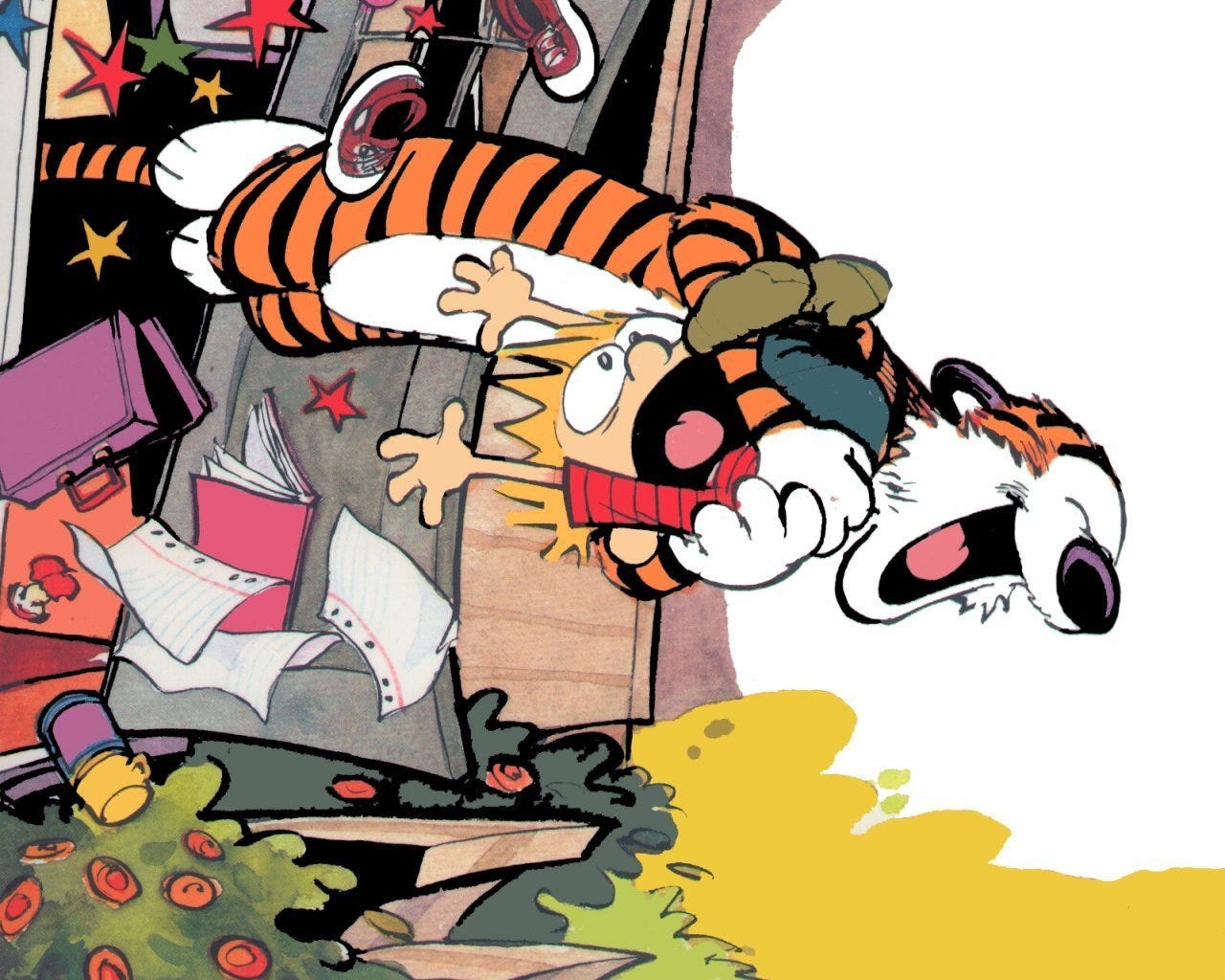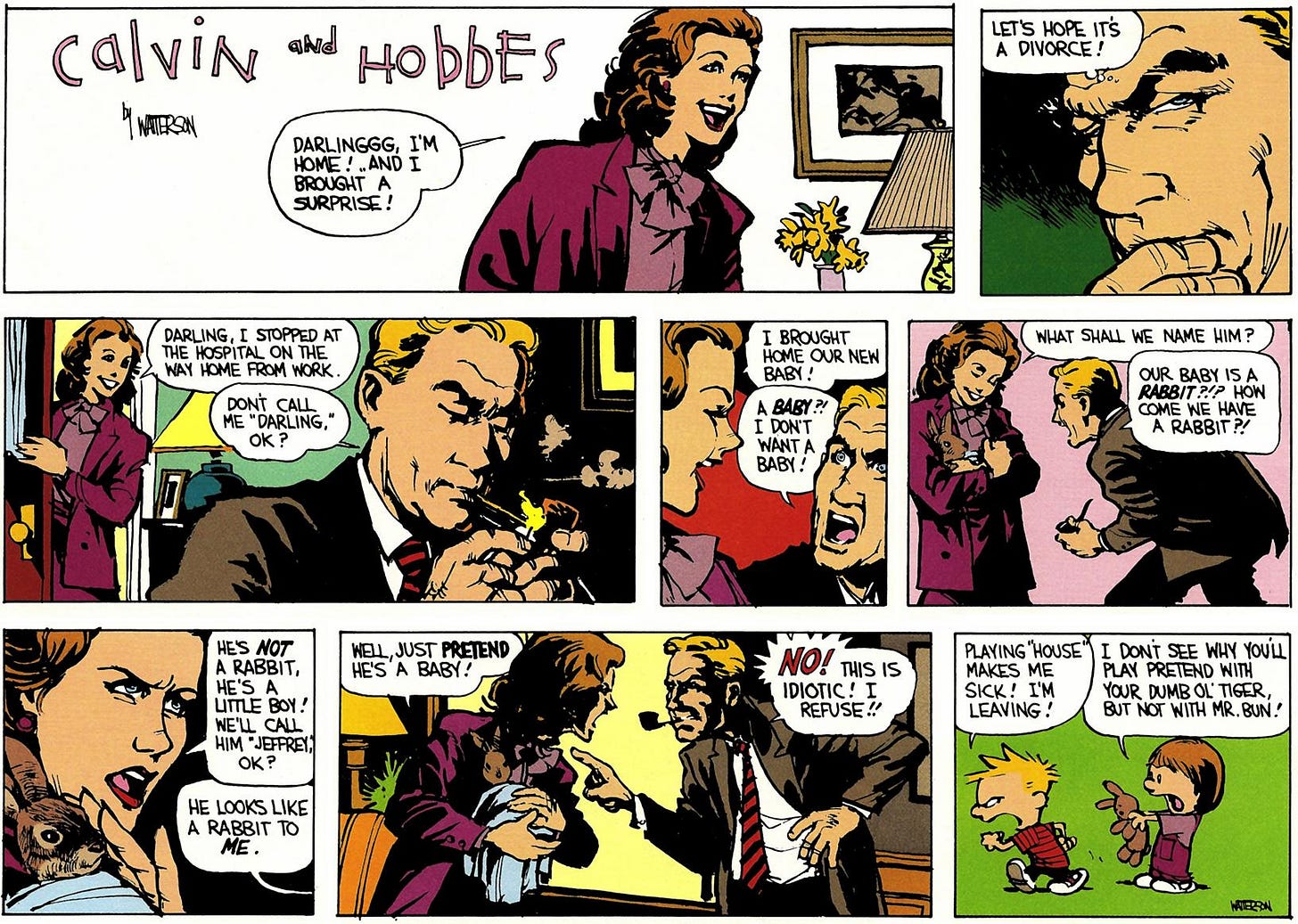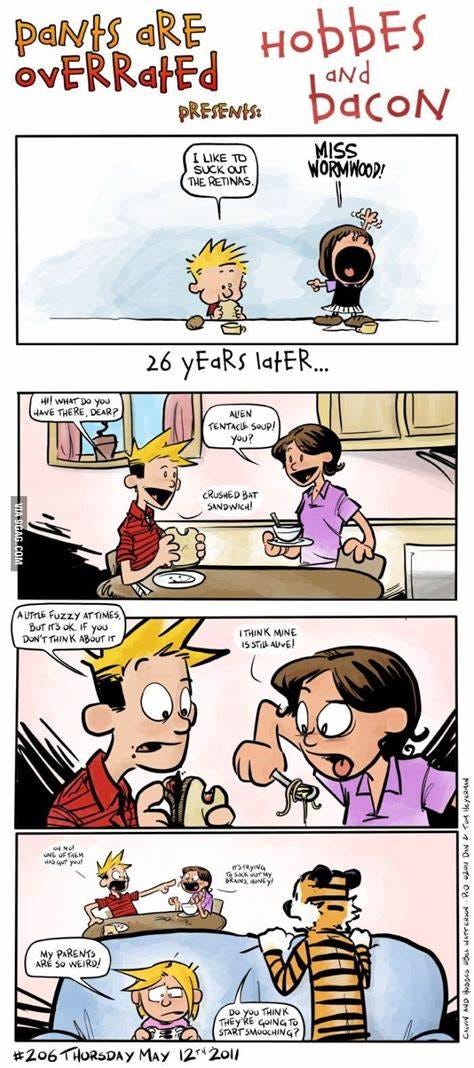My boys love Calvin and Hobbes, and throughout the day the household is inundated with dialogue lifted from the pages of the complete collection they ravenously read. As a dad who has warm memories of childhood reading these comic collections, seeing such a treasure being passed down fills my heart.
For those who have no soul, Calvin and Hobbes was a famous daily comic written by Bill Watterson in the 1980’s and 90’s. It follows the adventures of Calvin and his imaginary friend, Hobbes, a stuffed tiger and they make up adventures for themselves and work through everyday life as a kid. It’s universally beloved to this day, probably largely because the artist refused to license his creation to anyone for the sake of artistic integrity, keeping the purity of the comic intact, well, other than the peeing Calvin decal. This isn’t to say everyone shares the same opinion. I recently had a conversation with a woman about the relative virtues of the comic.
"Everything he does is immoral! Nothing in there teaches proper morals or virtue." She exclaimed.
Of course, it's true he acts like a rambunctious troublemaker throughout the comic, but the idea there was no redeeming qualities or virtues in his actions flummoxed me. Didn't he show a zest for life? Didn't his wild antics give vitality and spirit to his existence? Wasn't his often justifiable rebellion against authority figures something to be admired? Wasn't his wild imagination in the face of stifling conformity a good lesson in life?
As much as I tried to argue these points, all she could see was a wild kid who caused trouble to those around him, showed little empathy for others feelings, and immersed himself in violent and whimsical fantasies. She was at a loss how such behavior could mold him into a strong and capable man later in life. It was only a few days later that I realized where the disconnect was.
She was Susie Derkins.
This isn't meant as an insult. In the same way it's not an insult to say a gazelle has no understanding of the mind of a lion, or the peasant farmer will never understand the mind of a steppe warrior, the disconnect between their natural states is too vast. The brilliance in Watterson’s writing was to avoid turning her into simply a straight character or an annoying shrew, but creating a real foil the reader can also sympathize with. Girls like Susie can be wonderful additions to a society, and can also create the most repressive longhouse known to man when surrounded with like-minded people, where it becomes a battle to who can conform to authority the most for a pat on the head.
Susie has more of the qualities modern culture desires. She is an obsessive rule-follower, academic, follows all the social mores, and has aspirations to enter a respectable profession. Her only wish is to fit into the current mold of wider society. In the future, she will be a useful, though unimaginative cog in the wider culture. In itself, there is nothing wrong with this, and people like this often act like the glue that makes a community function. She's a genuinely caring person who simply wants to fit into the society she finds herself in. If she lived in a bizarro world where children got accolades in creating the perfect snowball, having the most overactive imagination, or knowing all there is to know about dinosaurs, she would spend her time trying to out-Calvin Calvin. She would never surpass Calvin, of course, since Susie relies on outside accolades to find her way, while for Calvin it’s in his veins.
We can contrast Susie with his babysitter, Rosalyn, a typical teenage mean-girl. She's selfish, cold, and uncaring for those outside her circle. She only babysits for the money, and there is none of the female warmth for children you would like to see. Her interest is only in bleeding Calvin's parents dry of cash. It's no coincidence the one time she tries to work a compromise with him when she volunteers to play Calvinball she has the the happiest time with him. He accepts with adorable enthusiasm, as she is likely the only other person who ever offered to play. In the end, she has the easiest babysitting job she ever had, and finally gets the best of him, and actually seems to have fun. One would hope this episode made her see kids like Calvin in a new light as she enters adulthood. Even Rosalyn shows character development, and one can’t help but get the feeling she had fun.
Calvin, in contrast, has no fitting role in the world yet. He has an imaginary friend because his mind is worlds apart from all of his peers. His aspirations are wild and borderline megalomaniacal, and he spends his time in school dreaming of flying fighter jets, getting into life-or-death battles with distant aliens, or simply planning a convoluted scheme to get back at his enemies. His eyes are raw, unfiltered, seeing a land full of possibilities. As grandiose and impractical as his seven-year-old thoughts are, he sees potential in everything he encounters, eschewing any customary wisdom in favor of seeing hours of adventure in a small creek or even a simple cardboard box. It’s only a boy like Calvin who can be innovative enough to stash away a snowball in the freezer until the middle of summer to pelt Susie with, and in the heat of the moment miss her.
While the comic seems like a light and cheery look into childhood, there are very dark undertones. Like the main character in “Adventure Time” doesn’t realize he lives in a nuclear wasteland, “Calvin and Hobbes” is set in a world that has no place for a rambunctious boy. There’s an inherent loneliness permeating the comic from the title on, that Calvin only has an imaginary friend who understands what makes him tick.
Calvin never comes across a figure that can channel his energies toward finding his way in the world. Another recurring character, the bully Moe, is bigger, stronger, and dumber, and only serves to beat him instead of giving comradery. His teacher, Mrs. Wormwood, checked out of creating any sense of wonder in her classroom long ago and is going through the motions. She wants conformity, placing it even above learning. His mother doesn't understand the energetic boy she bore, though she loves him, and his father prefers to play games with his head and joke as opposed to being a true mentor.
Not that Calvin's dad detached as much as failed to expand outside his own comfort zone. He tries to teach him to ride a bike to share his own love of riding, but Calvin is dismissive. He tries to teach Calvin the joys of camping, but can't connect in that way. It's not that he doesn't try, but that he's as clueless as his wife about how his own child sees the world. One gets the idea that while it's implied he had a wild youth, he settled down as a patent lawyer and forgot what it was like to be a child. There’s the gentle touch that his parents, even if they rant in frustration as parents do, they genuinely love their kid, as seen when they rescue Hobbes a couple times from being lost forever. For all their flaws, a lot of children would kill to have parents like Calvin’s.
The most tragic episode in the comic happened when Calvin joined the school baseball team and the coach, who had little care for any of the kids and seeing Calvin had no clue how to play, simply put him in right field to get him out of the way. Unbeknownst to Calvin, his team finished defense and were set to bat, but he stayed in the outfield because he didn't know what to do. Then one of his teammates hit a fly ball, which Calvin caught to his great pride, until his teammates lambasted him for causing an out on his own team.
Calvin then went to his coach and sheepishly said he didn't want to play anymore, to which the coach said "okay, quitter." Calvin clearly had skill in catching that fly ball, and the coach crushed him without mercy. Mrs. Wormwood didn’t have the faculties to mentor Calvin, but that coach did. One gets the idea the school system has chewed up and spit out the adults running it to the extent they no longer see children, but pests that create work.
Susie Derkins, on the other hand, has the world catered to her sensibilities. She loves school because she loves the accolades she receives from authority figures. Her aspirations, whether they are having kids or being a girl-boss, are catered to and considered mature. Whenever she gets harassed by Calvin, authority figures immediately swoop in to defend her. It's not her fault the world she was born into gave her more advantages and comfort, and there's nothing wrong with her taking advantage of it. She’s just in a protective bubble, and has no understanding of what is required to keep her small world turning.
In a way, the comic showed the stark realities of being a young boy trying to find his way. He is surrounded by types like Susie Derkins, who can't help but be Susie Derkins. The real failure happens in the men who should have been there for him, channeling his energies toward finding a place in the world, and pushing back against the busybodies and scolds who want him to act more like a pliable, conformist little girl.
There is a strong separation between the worlds that are conducive to these two personalities, which largely personifies how people make their way in the world. Before the age of one size fits all hyper-efficiency and panopticon-level surveillance, both would thrive. Elders understood that giving rambunctious children room for adventure that channels into productive ends later in life, whether it be the military, exploration, or entrepreneurism. Most admins once understood they didn't ask about hazing rituals to enter a group as long as it didn't get out of hand. They once knew to turn a blind eye to whatever partying the boys were doing in the woods as long as they drove sober. They once understood the balance between being socially acceptable and stifling the passion and energy of young men who will become the next great leaders.
We live in a one-size-fits-all world designed to cater to the Susies of the world, and then act surprised when people who don't fit that mold can't function. Putting the Susies in charge, tragically, contrary to giving them fulfillment, have made them miserable along with everyone else. Deep down, the Susies of the world don't want to live in their own strict, conformist world, but the exciting wonderland of Calvin.
In the comic Susie is always curious to know what Calvin is planning, and even invites her to her parties. One would think that she would avoid a boy who threw water balloons and snowballs at her with malicious glee, but she comes back for more. As much as she hates getting picked on by Calvin, and regardless of how much he makes her life frustrating, she gets drawn into his world. Like someone who watches the vast wilderness outside the prim and proper village, she can’t help but be curious about what lies out there, and what strange and untamed adventures await. She’s not a person who can forge a path on her own, though. She needs Calvin for that.
Whenever they play, Susie insists on quaint and domestic settings, dealing with events she thinks mature adults deal with, whether it be a doctor’s visit or a new baby. She’s practicing for her foreseen role in life, while Calvin grows frustrated with the inanities of the scenarios, consistently making their games go completely off the rails and leaving both angry and dejected. The truth is Calvin needs Susie too. Those are the mundane aspects of civilization that he will eventually need to protect if he wants to become a man.
Despite all their fighting, the Calvin and Susies of the world need each other for culture to thrive, and we need to find a way to make it happen.












"'Everything he does is immoral! Nothing in there teaches proper morals or virtue.' She exclaimed."
Tell me you don't understand boys without actually telling me "I don't understand boys."
Ironically this came about from an attempt especially during the 1960s, 1970s, and 1980s to make the world more accommodating to Calvins. As a result a lot of Susies ended up on the Calvin track and proceeded to destroy it. So now we have people mindlessly chanting "I'm a very unique individual" in unison.